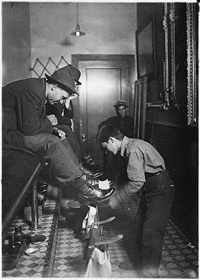
As a physical therapist on the forefront of the profession’s movement towards autonomous practice, I often find myself confronted with the fact that physicians don’t have a blue print of APTA’s Vision 2020 in their daily planner. Which means that sometimes a physician will treat a physical therapist more like a worker than a professional. On one side of the spectrum, and similar to my experience working in the Army health care system, some physicians treat physical therapists as colleagues, often asking for input on patient appropriateness, diagnosis, and dictating open-ended referrals. Alternatively, and not 20 miles down the road, I live near some very conservative, old southern physicians who would gladly have me shine their shoes and wax their car when I’m done applying the moist heat and ultrasound. I expect the norm across the United States lies somewhere in between these two extremes.

The opinions of most physicians can be observed in the type of referral they write to physical therapy. I either get an consult-ish, "evaluate and treat" open referral, or a more prescriptive, "3x/week, 4 weeks, hot pack, ultrasound, strengthening" referral. From my perspective, I only need the first kind, as I know how to do my own job. A prescriptive consult between physicians is unheard of. Imagine a family medicine doc sending a referral to an orthopaedic surgeon that read, "Shoulder pain, instability, please perform capsular shift and progress with conservative strengthening protocol over 8 weeks!" The open consult is more consistent with autonomous physical therapist practice.
How can we reconcile these two types of physician referrals? I am strongly biased towards the open referral type, but can research tell us anything about which of these two attitudes result in the best patient care? Gary Brooks and colleagues hypothesized that a prescriptive referral would result in a higher utilization of resources by reasoning "that prescriptive referrals oblige therapists to negotiate patient management issues with physicians, creating a greater administrative burden that may be reflected by a higher number of patient visits."
In their research, which was limited by a very low inclusion of patient records (6.8% of eligible subjects) this hypothesis was not supported. What they did find, was that the type of referral was not associated with number of visits, but was attached to a greater level of discharge disability. This study can then add to the argument that a prescriptive referral is of no extra help in the provision of physical therapy services, and might be associated with poorer patient outcomes.

I would have liked to see a greater sample size, but this was limited as most eligible records were incomplete due to patients not completing their physical therapy sessions and so discharge data was often missing. That is a shame, because research like this can really help to reconcile some differences with physical therapist-physician relationships. I wonder if the subjects in the study had deemed themselves ready for discharge prior to the physical therapist considering them as such. If so, did this study churn up a practice pattern of generalized over-utilization by physical therapists as they string out patient visits? It’s possible, and much more likely when the physician dictates an arbitrary number of visits irrespective of patient progress.
My conclusions: I continue to consider open referrals more appropriate, with some small exceptions for post-surgical protocols of complicated surgeries. I now have this bit of research in my pocket that tells me the prescriptive referral is at least no better. I look forward to more research of this type that also delineates the differences when physical therapist expertise is factored into the mix.
As an aside, when I posed the question that is this post’s title to one of my first year PT students, she reflexively responded, "NO!" I look forward to the day when a medical student might answer the same question in the same manner. Then, we would be getting somewhere.
ERIC
Brooks, G. (2008). Is a Prescriptive or an Open Referral Related to Physical Therapy Outcomes in Patients With Lumbar Spine-Related Problems?. Journal of Orthopaedic and Sports Physical Therapy, 38(3), 109-115. DOI: 10.2519/jospt.2008.2591








